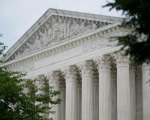News
Tennessee Preacher and MAGA Celebrity Greg Locke Claims YouTube Has Banned Him
Greg Locke, a Tennessee pastor known for his viral videos about COVID-19, election conspiracies and witchcraft, claims another social media giant has given him the boot. A Donald Trump supporter who has been featured at Christian nationalist events such as America’s Revival and disgraced former Trump official Mike Flynn’s ReAwaken America tour, Locke was banned from Twitter last year for spreading misinformation.
Review: Church on the Move
Robert D. Cornwall reviews "Church on the Move: A Practical Guide for Ministry in the Community" by G. Travis Norvell. Churches can easily become insulated from the surrounding world. They create silos by turning turn inward, seeking to protect whatever space they have accumulated over the years. This book challenges us to examine our context and consider how the church can be present in the broader community.
Did Faith Fall off a Cliff During COVID? New Study Says No.
When the pandemic hit, many Americans lost the habit of churchgoing after almost every church in the country closed their in-person services and shifted online. But did some of them give up on God? In a new study, sociologists raise questions about the rapid decline in indicators of “intense religion” during the pandemic, which they argue may be due to changes in a popular survey rather than a sign of religious decline.
A Requiem for Twitter
As Twitter’s new owner bumbles along and risks destroying the very network he just purchased for $44 billion, we thought we’d take a look at why this matters — even to people not on Twitter. In this issue of A Public Witness, we look at the erratic chirping happening right now at Twitter. Then we suggest what might be lost if the blue bird app goes the way of Myspace or Friendster.
The Keys to Letting Go
Pastor Dawn Darwin Weaks explores what it was like for a once large and vibrant church community to decide to make a major change. With only a few dozen active people left, they made the choice to relocate, rename, and relaunch together. Before the 116-year-old congregation gathered for worship in a new space, they performed one last ritual in order to truly let go.
A ‘Missionary to Christian Nationalists,’ Phoenix Pastor Urges Conversion, Not Confrontation
Phoenix pastor Caleb Campbell has a theory about the growing number of Americans who are labeled as Christian nationalists. Most would rather go to Cracker Barrel than storm the Capitol. Many see themselves as good Christians who love their country. But somewhere along the way, they began to think being a good American and being a Christian were one and the same.
Learning from the Midterms
For months, we’ve documented the appearances, rhetoric, and political activities in religious settings of candidates running for office on a platform of Christian Nationalism. Many voters rejected this worldview to a shocking degree in Tuesday’s midterm elections. In this edition of A Public Witness, we take a look back at our earlier reporting on various races, and we consider the ongoing test facing American democracy.
Religion Plays a Role in Native American Adoption Case Before Supreme Court
As the Supreme Court hears Brackeen v. Haaland, what is at stake for most interested parties is the decades-old Indian Child Welfare Act. The act was meant to stop Native American families from being separated by child welfare agencies and private adoption services and instead seek placement for children within a federally recognized tribe. But some also see it as case about religious liberty.
Review: How to Inhabit Time
Robert D. Cornwall reviews "How to Inhabit Time: Understanding the Past, Facing the Future, Living Faithfully Now" by James K. A. Smith. This book explores how we experience time and with past and future framing our life experience, the question we face concerns how we might live faithfully in the present. Smith argues that divine grace allows us to overcome the realities of the past even if we can’t erase that past.
Despite Mastriano’s Loss, Don’t Count Out Christian Nationalism
Political operatives were keeping an eye on Mastriano because of how the Pennsylvanian deployed Christian nationalist themes to secure the hard-line religious right base. Mastriano broke out of the Republican primary pack by cloaking himself in one of the most vocal strains of Christian nationalism: anti-pandemic restrictions, pro-conspiracy theories about the 2020 election and dubious of separation of church and state.










